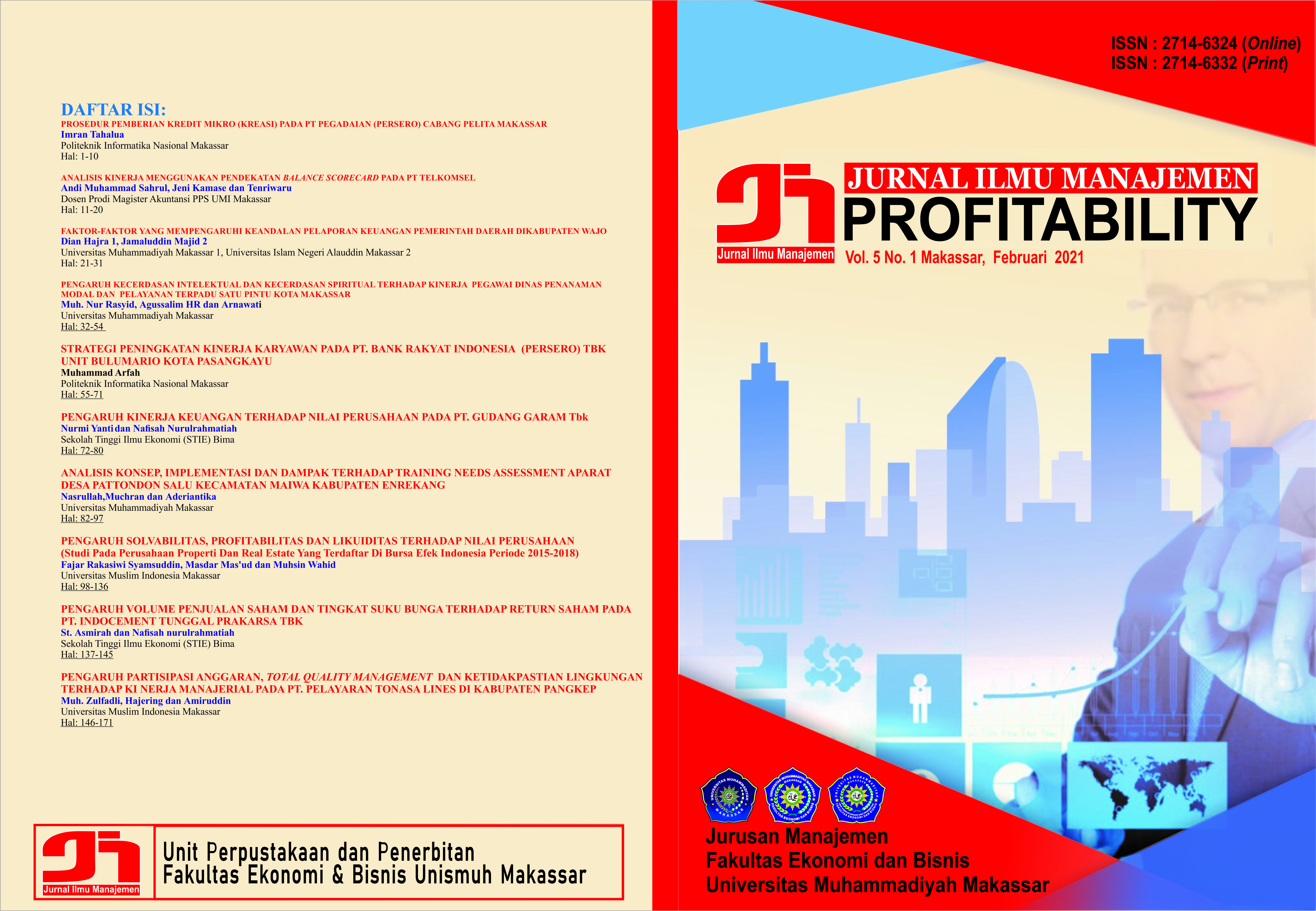PERFORMANCE ANALYSIS USING BALANCE SCORECARD IN PT TELKOMSEL
DOI:
https://doi.org/10.26618/profitability.v5i1.4853Keywords:
Performance measurement, Balance scorecardAbstract
This study aims to measure the performance of PT Telkomsel using the balance scorecard approach from a financial and non-financial perspective; customer perspective, internal business process perspective and, growth and learning perspective. This research is a descriptive study using a mixed method approach, namely a combination of qualitative and quantitative research combined with an explonatory design research model, the data sources of this study are primary data in the form of interviews with informants and questionnaires, and secondary data from literature, financial reports, as well as supporting data related to this research. The results showed a decrease in several financial posts due to changes in government regulations and price competition among telecommunications service providers. From the customer perspective, price product has become a complaint of several customers. From the perspective of internal business processes, it shows the fluctuating value of ARPU and operational costs due to these changes. Continuous training has become a complaint of some employees from a growth and learning perspective, but in general PT Telkomsel's performance with the balance scorecard as a performance measurement tool is already very good.
References
Annual Report PT, Telekomunikasi Selular tahun. (Online), (https://www.telkomsel.com/about-us/investor-relations), diakses 20 Maret 2020.
Darmasto, Kamaliah, Agusti. 2016. Analisis Pengukuran Kinerja Perusahaan Dengan Metode Balance Scorecard (Studi Pada PT Smartfren Telecom Tbk - Jakarta). Riau: Universitas Riau. Volume 9 Nomor 1. Hal. 70-85. ISSN 1907-364X.
Kasmir. 2016. Analisis Laporan Keuangan. Jakarta: Penerbit Rajawali Pers.
Kaplan, Robert S. dan David P. Norton. 2000. Balanced Scorecard: Menerapkan Strategi Menjadi Aksi. Dialihbahasakan oleh Peter R Yosi Pasla. Jakarta: Erlangga.
Kurniasari, Memarista. 2017. Analisis Kinerja Perusahaan Menggunakan Metode Balance Scorecard (Studi Kasus Pada PT Aditya Sentana Agro). Surabaya: Universitas Kristen Petra. Volume 5 Nomor 1. Hal. 1-7.
Lestari, Sri. 2016. Pengukuran Kinerja Dengan Pendekatan Balanced Scorecard Pada Rumah Sakit PKU Muhammadiyah Gombong Tahun 2013 dan 2014. Skripsi. Yogyakarta: Universitas Negeri Yogyakarta.
Mulyadi. 2015. Alat Manajemen Kontemporer Untuk Pelipatganda Kinerja Keuangan Perusahaan. Jakarta: Penerbit Salemba Empat.
Siyoto, Sandu dan Ali Sodik. 2015. Dasar Metodologi Penelitian. Cetakan ke-1 Yogyakarta: Literasi Media Publishing.
Sugiyono. 2014. Metode Penelitian Pendidikan Pendekatan Kuantitatif, Kualitatif, Dan RdanD. Bandung: Alfabeta.
Widodo, Iman. 2011. Analisis Kinerja Perusahaan Dengan Menggunakan Pendekatan Balance Scorecard (Studi Kasus Pada Perusahaan Mebel PT Jansen Indonesia). Semarang: Universitas Diponegoro. Hal. 1-89
Downloads
Published
Issue
Section
License
Authors who publish with Jurnal Ilmu Manajemen Profitability agree to the following terms:
Copyright of the articles remains with the authors.
Authors grant the journal the right of first publication with the work simultaneously licensed under a Creative Commons Attribution-NonCommercial 4.0 International License (CC BY-NC 4.0). This license allows others to:
Share (copy and redistribute the material in any medium or format)
Adapt (remix, transform, and build upon the material)
as long as they give appropriate credit to the original author(s) and source, provide a link to the license, and indicate if changes were made. Non-commercial use only.
Authors are permitted to:
Distribute their published work (e.g., post it to an institutional repository or publish it in a book), with an acknowledgment of its initial publication in this journal.
Enter into separate, additional contractual arrangements for the non-exclusive distribution of the journal’s published version of the work (e.g., post it to a class website or institutional archive).
For permissions to use the content published in this journal beyond the scope of the license (e.g., commercial purposes), please contact the editorial office via the journal email.
License Details:
This journal is licensed under a Creative Commons Attribution-NonCommercial 4.0 International License (CC BY-NC 4.0).

